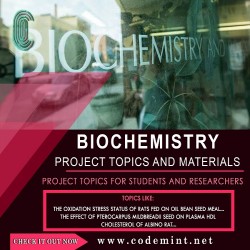- The Complete Research Material is averagely 52 pages long and it is in Ms Word Format, it has 1-5 Chapters.
- Major Attributes are Abstract, All Chapters, Figures, Appendix, References.
- Study Level: BTech, BSc, BEng, BA, HND, ND or NCE.
- Full Access Fee: ₦6,000
Get the complete project »

Oil obtained from orange peels and velvet tamarind nut by solvent extraction (n-hexane and acetone) using the soxhlet extractor were investigated as feedstock’s to determine some of the suitable parameters such as iodine value, saponification value, specific gravity, density, acid value and free fatty acid value, and their percentage yield that are suitable for biodiesel production. The density of orange and tamarind oil were found to be 0.9326g/cm3 and 0.8541g/cm3 respectively, their acid values were 19.81gNaOH for orange oil and 18.93gNaOH for velvet tamarind oil. The degree of unsaturation of both oils as determined by their iodine values were; 10.47gI2/100g for orange oil and 5.39gI2/100g for velvet tamarind oil. The viscosities of the oil were 11.29mPa.s and 26.55mPa.s for orange and velvet tamarind oil respectively. The various values obtained were compared with specifications of ASTM D6751 standard and established that the oil obtained from orange peels and velvet tamarind nuts could be used as alternative to/or blended with petro diesel.
You either get what you want or your money back. T&C Apply

You can find more project topics easily, just search
-
SIMILAR BIOCHEMISTRY FINAL YEAR PROJECT RESEARCH TOPICS
-
1. CARDIO PROTECTIVE ACTIVITIES OF N-HEXANE EXTRACT OF DESMODIUM VELUTINUM STEM ON ALBINO WISTER RAT
» ABSTRACT This study evaluates the effect of the cardio protective N hexane extract of Desmodium stem velutinum on wister albino rat. The rats used in ...Continue Reading »Item Type & Format: Project Material - Ms Word | 50 pages |
 Instant Download
|
Chapter 1-5 |
BIOCHEMISTRY DEPARTMENT
Instant Download
|
Chapter 1-5 |
BIOCHEMISTRY DEPARTMENT
-
2. EFFECTS OF SELENIUM TOXICITY AND DEFICIENCY ON HUMANS
» CHAPTER ONE INTRODUCTION 1.1. BACKGROUND INFORMATION Selenium (Se) is an essential trace element having biological functions of utmost importance for ...Continue Reading »Item Type & Format: Project Material - Ms Word | 45 pages |
 Instant Download
|
Chapter 1-5 |
BIOCHEMISTRY DEPARTMENT
Instant Download
|
Chapter 1-5 |
BIOCHEMISTRY DEPARTMENT
-
3. Garcinia kola Heckel STEM BARK ETHANOLIC EXTRACT AND ITS TRITERPENOID FRACTION PROTECTED AGAINST SODIUM ARSENITE-INDUCED HEPATOTOXICITY AND NEPHROTOXI...
» ...Continue Reading »Item Type & Format: Project Material - Ms Word | 154 pages |
 Instant Download
|
Chapter 1-5 |
BIOCHEMISTRY DEPARTMENT
Instant Download
|
Chapter 1-5 |
BIOCHEMISTRY DEPARTMENT
-
4. EVALUATION OF THYROID DYSFUNCTION IN TYPE 2DIABETIC PATIENTS IN SOKOTO METROPOLIS
» ABSTRACT Diabetes Mellitus (DM) and Thyroid Dysfunction (TD) are the two most common endocrinopathies seen in general population.Type 2 diabetes melli...Continue Reading »Item Type & Format: Project Material - Ms Word | 69 pages |
 Instant Download
|
Chapter 1-5 |
BIOCHEMISTRY DEPARTMENT
Instant Download
|
Chapter 1-5 |
BIOCHEMISTRY DEPARTMENT
-
5. BACTERIOLOGICAL QUALITY OF FROZEN CHICKEN SOLD IN GWAGWALADA MARKET
» CHAPTER ONE INTRODUCTION The first consumer right is to have a product of good quality and not constituting any health hazard. Poultry meat products a...Continue Reading »Item Type & Format: Project Material - Ms Word | 52 pages |
 Instant Download
|
Chapter 1-5 |
BIOCHEMISTRY DEPARTMENT
Instant Download
|
Chapter 1-5 |
BIOCHEMISTRY DEPARTMENT
-
6. INVESTIGATION OF THE PANCREATIC EFFECT OF BUCCHOLZIA CORICACEA FORMULATED DIET IN SUCROSE FED PREGNANT RATS AND THEIR OFFSPRING
» ABSTRACT Several plants have been used in the treatment of various disorders without scientific basis. The present study examine the pancreatic effect...Continue Reading »Item Type & Format: Project Material - Ms Word | 52 pages |
 Instant Download
|
Chapter 1-5 |
BIOCHEMISTRY DEPARTMENT
Instant Download
|
Chapter 1-5 |
BIOCHEMISTRY DEPARTMENT
-
7. EXTRACTION, CHARACTERIZATION AND ANTI-MICROBIAL SCREENING OF WHITE STAR APPLE Crysophyllum albidum SEED OIL
» ABSTRACT Crysophylum albidum oil was extracted from its seed. The percentage yield was 2.56%. The characterization of the oil showed showed that the r...Continue Reading »Item Type & Format: Project Material - Ms Word | 52 pages |
 Instant Download
|
Chapter 1-5 |
BIOCHEMISTRY DEPARTMENT
Instant Download
|
Chapter 1-5 |
BIOCHEMISTRY DEPARTMENT
-
8. COMPARATIVE ANALYSIS OF VITAMIN C (ASCORBIC ACID) IN PINEAPPLE AND BANANA
» INTRODUCTION 1.1 HISTORICAL BACK GROUND Antibiotics are chemicals when the chemical are put into the body; they stop the growth of kinds of germs. The...Continue Reading »Item Type & Format: Project Material - Ms Word | 38 pages |
 Instant Download
|
Chapter 1-5 |
BIOCHEMISTRY DEPARTMENT
Instant Download
|
Chapter 1-5 |
BIOCHEMISTRY DEPARTMENT
-
9. PROXIMATE ANALYSIS OF SEED AND COAT OF VELVET BEAN (Mucuna pruriens) AND CAMWOOD (Baphia nitida)
» CHAPTER ONE 1.0 INTRODUCTION Seed and coat of Mucuna pruriens, known as velvet beans or cowitch has scientific classification as shown below; Kingdom ...Continue Reading »Item Type & Format: Project Material - Ms Word | 52 pages |
 Instant Download
|
Chapter 1-5 |
BIOCHEMISTRY DEPARTMENT
Instant Download
|
Chapter 1-5 |
BIOCHEMISTRY DEPARTMENT
-
10. ANTI-SCHIZOPHRENIC EFFECT OF METHANOL LEAVE EXTRACT OF INDIGOFERA ARRECTA IN ALBINO MICE
» CHAPTER ONE 1.0 INTRODUCTION 1.1 General Overview Psychosis is a heterogeneous neuropsychiatric disorder characterized by distorted or non existent se...Continue Reading »Item Type & Format: Project Material - Ms Word | 52 pages |
 Instant Download
|
Chapter 1-5 |
BIOCHEMISTRY DEPARTMENT
Instant Download
|
Chapter 1-5 |
BIOCHEMISTRY DEPARTMENT


